
Babe: Pig in the City (1998 - Streaming Video)
While this movie does have its moments of humor and impressive animal acting, I felt like it was favoring weirdness and emotional manipulation over a coherent story. The Hoggetts are in danger of losing the farm, so Babe and Mrs. Hoggett go to an unnamed hodgepodge European city in an attempt to save it. They end up stranded at the only hotel in town that allows animals, but due to some vague ordinances they run their operation covertly. Babe discovers a group of primates lives there along with the usual cats and dogs, and what ensues is a series of chases and utter chaos until the movie arrives at a conclusion that resolves the situation for the immediate characters, but not the city's anti-animal laws. What about anyone else traveling with a pet, or other strays that live there?
There are problems with using primates in a movie like this - the lip-sync animation can only do so much. Since they have much more complex facial expressions than cats, dogs, pigs, and birds, quite often the way they look does not match the situation. Thelonious the orangutan, for example, is supposed to be a wise old mentor type. But most of the times, he reminded me of the kid from Close Encounters of the Third Kind.
I had such difficulty trying to understand why I should empathize with some situations that it eventually angered me. Mickey Rooney, playing what seems to be a washed-up circus clown, kidnaps Babe and forces him to perform in his routine for an empty promise of reward money. The way this character is introduced is having him run into the room with his mouth and chin dripping in ice cream! Since real ice cream melts fast under hot studio lights, it's the fake movie ice cream that looks especially thick and disgusting. So, we have a gross character who kidnaps a pet and lies to him about being paid for his work. Oh, but he's doing the routine for sick children! So, it's all for a good cause! When Babe messes up the act because he doesn't understand what's going on and certainly hasn't been trained for it, then it's all, "Shame on you, Babe! Look what you've done!" No, sorry, not onboard with that.
The clown ends up being taken away on a gurney and the woman who runs the hotel, whose relationship to him has not been explained, disappears with him - leaving all the animals alone, with no food, for what I thought was several days, but later she claims she was only gone one day (really, all that stuff occurred in just one day??). Emergencies happen, but jeez louise, I would've stopped back at some point to feed my pets.
Rating: 2.5/5
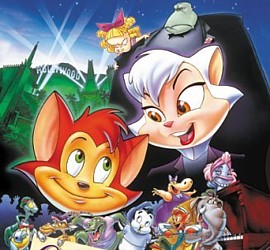
Cats Don't Dance (1997 - Streaming Video)
Well, if this isn't the most hypocritical movie I've seen in the past decade, I don't know what else is. The not-so-subtle subtext of Cats Don't Dance is the difficulty minorities had in landing good movie roles in the early days of film. This is not a bad premise, but a movie whose cast consists of only one person who isn't white making this call reminds me of Stuart Smalley on Saturday Night Live saying that when you point your finger at someone, you have three pointing back at you...and a thumb pointing up at God. In this case, the thumb seems to be pointing at Shirley Temple. For some reason, the villainess is a Shirley Temple knockoff named Darla Dimple. I have never seen a Shirley Temple film and don't personally know what the appeal is, but still... How is it a child actor's fault that adults weren't hiring minorities for major film roles???
Even taking the film at face value, then what's the message? That MGM should've put the lion in more things than the intro? Danny (the main character) came across as annoying to me, and the wacky Warner Bros.-style animation, presented here at exceptionally breakneck speeds, may look impressive, but doesn't really work in a serious story.
Rating: 2/5

The Complete Metropolis (1927 - Streaming Video) 
I watched the most complete version of Austrian director Fritz Lang's sci-fi/social commentary masterpiece, Metropolis, that's available - the 2010 restoration with a total running time of about 148 minutes. Parts of the movie long-thought lost forever had been found on a 16mm print in a film museum in Argentina. These scenes (noticeably more grainy than the rest of the movie) had been restored by Kino Classics, and a new production of the original score was added.
One thing I kept hearing about the earlier restorations is that the story became choppy and incoherent from about the mid-point to the end. The restored footage must have greatly corrected that, because not since 2001: A Space Odyssey (and to a slightly lesser extent, How I Ended This Summer) have I seen a film that gets across almost its entire story with just its visuals and music alone. This website (massive spoilers) provides a detailed explanation of the scenes added to the 2010 version, and yeah, I can't believe how much had been cut. No wonder earlier versions made no sense. Aside from maybe one or two "WTF?" moments, I didn't have any trouble following or understanding the restored version. Incidentally, this was also the first silent film I've ever seen, and although there is some interstitial dialogue, it's rather sparse, so it's quite an accomplishment that the story works.
In a dystopian future, in no distinct country, lies the city of Metropolis, where there is a huge class disparity between the wealthy elite and the workers who live in the caves below the city streets and run all the city's machinery during long 10-hour work days. The workers are planning a rebellion, but a woman named Maria whom they look up to as a saint assures them that a mediator between the upper class and the lower class will arrive. Maria's "savior" might be Freder, who happens to be the son of Joh Fredersen, head of Metropolis. Freder meets Maria by chance one day, and he falls instantly in love with her. Freder has a boyish, naive charm, completely the opposite of his stoic father, which makes him a very likeable character. Upon witnessing some of the evils that the city bestows upon its lower (and sometimes even its upper) class, Freder decides to take action. But things don't go as planned when a mad scientist, Rotwang, with an android duplicate of Maria creates complications.
It's a very mesmerizing journey with an amazing "art deco" visual style and special effects that were not only state-of-the-art for 1927, but have held up surprisingly well over time. The acting is a little over-the-top at times, but it has to make up for a lack of dialogue, so it gets the point across. I never once had difficulty telling good Maria from evil Maria, nor had any trouble thinking of them as two separate characters, despite that Brigitte Helm doesn't look or (usually) dress any differently for them - she just changes her facial expressions and body gestures/movement. It seems like Rotwang is quite possibly where the "mad scientist" archetype originated, and his influence can be seen especially in Dr. Pretorius from the 1935 Bride of Frankenstein and in the title character of Dr. Strangelove, right down to the one-gloved hand, and even Doc Brown from Back to the Future. I feel like he inspired my own Dr. Honen Calzoun by proxy. I'd never seen this movie before, but when I look at this, I see Honen.
I'm hesitant to give a perfect score, despite the film's achievements and landmark status, because some of the story elements would probably make more sense if the rest of the missing footage could be found. I didn't quite understand why Joh Fredersen allowed the workers into the Heart Machine, only to regret it afterwards, and I wonder if the missing fight scene between Fredersen and Rotwang (replaced with a screen of explanatory text) would make Rotwang suddenly mistaking Maria for Hel make more sense. I might want to watch it again some time before committing to the perfect score, too, which I definitely plan to do.
Incidentally, I learned that H.G. Wells infamously panned Metropolis, calling it "silly", amongst other things. (The movie does have a fairytale-like sensibility - maybe
he expected it to be more serious?) Strangely and coincidentally enough, I had read The Invisible Man a month prior and found parts of it silly. I guess what goes around, comes around.
Rating: 4.5/5
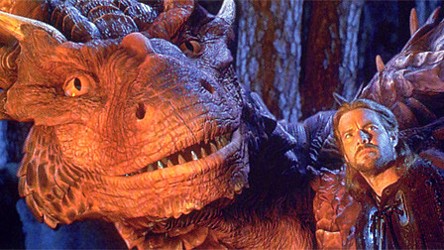
Dragonheart (1996 - Streaming Video)
This was the first movie I borrowed from the digital service that I had actually seen before, but it's been so many years, I didn't remember much about it. Nowadays, I feel like it's a near miss. The dragon special effects are exceptionally good and convincing. Normally, I can understand the backlash against the overuse of CGI in modern films, but there's no denying that it provided a much more realistic dragon here than the models did for Dragonslayer. Draco, the dragon, is a fun and charming character, thanks in part to his expressive face and his voiceovers provided by Sean Connery, who seems to have resurrected his Henry Jones Sr. role from The Last Crusade, though in sound only. However, the plot feels weak. The movie doesn't seem to know exactly what it wants to be, sometimes having brutally violent scenes as though it had Braveheart envy (which might not be entirely conjecture considering the similarity of the titles), and other times meandering into slapstick comedy routines that, on some occasions, last too long.
Other times it doesn't make much sense. For no explained reason, the king (and later his son) keeps attacking this random settlement of villagers. I dunno, maybe their houses weren't up to code? The morality's a bit dodgy. Draco may not make it to Heaven because he gave a kid who turned out to be evil half of his heart to save his life. Well, what does that say about Bowen, who slaughtered a bunch of innocent dragons on his path to take revenge on Draco? Draco needs to be redeemed, but not Bowen? The fight scenes are better than those of Dragonslayer, but still have moments of weakness. When Kara kills the big bearded guy, it's not clear at all what she did to win.
The second-best thing next to the special effects is the rousing score by Randy Edelman (which I've actually owned on CD for years), and I admit to getting a little choked up by the ending, which wouldn't have worked if Draco hadn't been so likeable (and man, did Disney ever rip that off with the firefly in The Princess and the Frog - no wonder that scene seemed so familiar to me). So, I can't give a really strong recommendation, but since fulfilling fantasy movies are few, and ones with believable dragons even farther between, it might be worth checking out if you're hungry for the genre.
Rating: 3/5

The Last Lions (2011 - Streaming Video)
This is the first time I have ever given a high rating to a movie I can't actually recommend seeing to all but the most strong-willed and iron-stomached of viewers. Nature documentaries are notoriously rough, because, well, nature is brutal and unforgiving. I don't think I have ever seen a nature program about wild cats with three cubs in which one of them doesn't end up getting killed before the end. This movie is no exception, and I didn't think it would be, so I prepared myself for the first lion cub death. At least it's over with quickly.
What I was not prepared for was the second death, and while the first one was quick, the second one might be too heartbreaking for most viewers to bear. The movie has a PG rating on IMDB, but I have a feeling that scene will make a lot of kids cry.
What makes this documentary extraordinary compared to other nature programs about lions is that it follows a very specific and unusual situation. The habitats for lions in Africa are receding due to human populations, causing rival prides to encroach on each others' territories. A lion and lioness with three cubs are attacked by an invading pride, which results in the death of the lion. The lioness must look for a new place to raise her cubs, and is forced onto an island teeming with African buffalo. While the buffalo could provide a food source, killing one is not so easy when you're just one lioness against an entire herd. All the while, the invading pride, intent on killing the lioness and her cubs, is working its way to the island.
If you can make it past the heartbreaking parts, there is a plot twist near the end that would be amazing for a fictional story, made all the more jaw-dropping by the fact that this movie is reality. (If only I could stick a buffalo between the two cats I have that fight all the time, maybe it would resolve their issues.) So, while there are some very sad parts, at least it doesn't end sadly.
I only have one question that really bugged me when the movie continually failed to address it: While the lion family was trapped on the island, it took a lot of attempts and failures for the mother lioness to kill a buffalo. What were they eating in the meantime? Or can lions go several days without any food?
Final note: The movie is narrated by Jeremy Irons, who voiced Scar in the Disney movie, The Lion King. I thought that was a nice touch.
Rating: 3.5/5
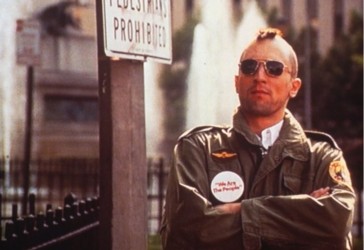
Taxi Driver (1976 - DVD) 
One of the most amazing things about Taxi Driver is that, according to the DVD's special features and other sources, director Martin Scorsese and writer Paul Schrader never intended for audiences to actually identify with Travis Bickle (Robert De Niro), or at least didn't think anyone would. But their movie is so skillfully written and directed that despite that Travis is a lonely outsider who makes a gradual descent into violent psychopathy, the very type of person whom most others would shun in real life and try their best to avoid, people did, in fact, see things from his point of view (which is where much of the film's perspective lies), and sympathize with him.
Travis is a Vietnam War vet who suffers from loneliness and insomnia, so he takes a job as a taxi driver, working long hours in 70s New York, when crime and violence was running rampant at an all-time high. Despite living in a city of millions, he can't make a connection to anyone he meets, and despises most of what he sees as the "depravity" and "filth" around him. When we see things from the perspective of Travis's cab window, the action takes on a weird, dreamy quality, wherein sometimes it does seem like the most insane person in the story (Travis) is actually the only sane person in a world of madness. Travis is trapped in a neverending cycle of negativity, ferried along in his coffin-like taxi, never able to see, find, or tap into anything good in life. He manages to get a date with a campaign worker (Cybill Shepherd), but ruins it when he takes her to a porno movie because he doesn't know much about other movies. (Proof for my theory that it's not such a bad thing to keep up on pop culture.) His answer is to go down a path of remorseless, self-justified vigilantism.
There is much controversy over the film's ending, and I admit that when I first saw it, I brushed it off as being a "Hollywood" ending. It seemed like everything suddenly worked out in Travis's favor, which is the exact opposite of how the entire rest of the movie is - every attempt he makes to live a normal life (or an even an abnormal one when he tries to assasinate a politician) ends in utter failure. This has led some to speculate the ending is a dream or fantasy sequence. I'm not discrediting that possibility, but after several viewings and ruminations, I now believe that the real answer is that it's only a feelgood ending on the surface, and the underlying issue is that even though Travis became a "hero" in the media's eye, his problems haven't really been solved, and he could go berserk again at any given moment. That's the real tragedy and horror of the situation.
Details like that can make what's already a great movie one better - if it can work on several different levels and you can find new things every time you watch. I didn't, for example, notice before this recent viewing that the man's hands getting shot near the end was foreshadowed in the scene where Cybill Shepherd is talking to Albert Brooks about lighting the match. Add to that some great, memorable scenes and dialogue (everyone has likely seen something that has referenced or parodied the famous "Are you talking to me?" scene where Travis converses with himself in the mirror), great performances (including one from then-child actor Jodie Foster), and a sultry Bernard Herrmann score, and you have a real classic, albeit a disturbing and even mind-bending one.
Rating: 5/5
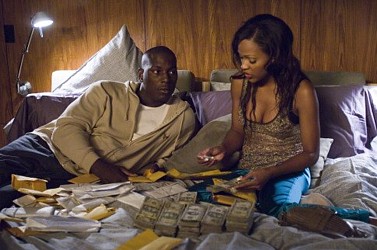
Waist Deep (2006 - Streaming Video)
The point of this movie seemed to be the writers/director throwing as many ideas from other movies into an urban crime/action story as they possibly could. It's one part any western that starts out with a character who's trying to escape his past, but gets drawn back into the violence of gunfighting because of extreme circumstances. It's one part A Fistful of Dollars, when the main character, O2, sets rival gangs against each other by stealing from them and making it seem like the other gang did it. It's one part Bonnie & Clyde, with O2 and his girlfriend robbing banks, and the girlfriend's method of distracting bank personnel is to channel Eddie Murphy from Beverly Hills Cop. Then it pulls a half-Thelma & Louise at the end.
The thing is, most of those ideas were the main plots of those movies, but here they just fit together in a string of action scenes with little resonance. The idea of setting the rival gangs against one another alone could've made an interesting story, but we don't really see much consequence from it. It seems like the action is going for a gritty/realistic sense, but the longer it goes on, the more contrived the plot twists become. The identity of the person who owns the strongboxes feels particularly tacked on.
The movie features rapper-turned-actor, The Game, but don't watch it for that reason because he's barely in it. Considering the background he came from in real life, I'd think it could be interesting to see him playing a drug lord, but the script gives him little to do but yell about wanting his money a lot and cutting a guy's arm off. Over-the-top, much?
The ending is one of the most surreal I've seen in awhile, as though 3/4 of the way through, the director decided he wanted to make a different movie than what he had. (Although, I'm pretty sure the reviewers who think O2 swam all the way from LA to Mexico are wrong, especially since he has the toy in his hand at the end, and he wouldn't have gotten that from the ocean.)
Rating: 2.5/5

The Witches (1990 - Streaming Video)
After reading in Street Gang about how upset Jim Henson would get when his movies didn't do well at the box office (although technically I had known about that already), a part of me feels like it's being torn apart by not being able to come up with nicer things to say about The Witches, a 1990 adaption of the Roald Dahl book about a young boy's attempt to stop a group of witches from turning all of England's children into mice. If it would make him feel any better, I don't blame Henson.
Part of it's the slow start, but the bigger issue is that it's difficult to find great child actors. The easiest way I can put it without being too mean is to say that the kid playing Luke reminded me a lot of Jake Lloyd in Star Wars Episode I, only possibly even more awkward. Yeah. It's not entirely him, either, the actress playing his grandmother seemed to be phoning in her performance. She died four years later, so I'm wondering if she was ill at the time the movie was made. It also annoyed me how Luke took his pet mice out for a stroll after he was just warned by the hotel manager (Rowan Atkinson) that he had to keep them in the cage or they'd be forced to leave.
About the best thing I can say about The Witches is that the effects for when Anjelica Huston, playing the Grand High Witch, changes into her "true" form are amazing, and the stunt work of the live mice and rats is also quite impressive (sometimes, puppet mice are used, too, but a lot of shots have real rodents romping about, climbing stuff, carrying things, etc.)
Oh, yes, random runaway baby stroller. One of my biggest pet peeves. I'll let it slide out of respect for Jim Henson, but I still can't give this movie a higher score than what I have.
Rating: 2.5/5



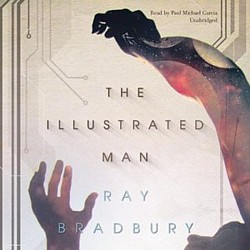
The Illustrated Man
Author: Ray Bradbury; Reader: Paul Michael Garcia
(Audiobook - 2009; Original Book - 1951)
One thing I learned when I checked out The Horror Stories of Robert E. Howard is that sometimes the short stories of even the most renowned authors aren't always everything they're cracked up to be. I haven't read much Ray Bradbury except Something Wicked This Way Comes, but I just hope his best works are better than the offerings of The Illustrated Man.
The book is a collection of 18 stories that are usually considered sci-fi, but I could argue that they're actually horror stories with sci-fi settings (usually Mars and/or the future). I've heard Bradbury had changing views on science and religion over the course of his life, but it seems like some of these were written during a time when he was fearful of science, likely because of the atomic bombs dropped during World War II. (Several of the stories have the world ending with a nuclear apocalypse.) The good news is that a fear of science may very well be what enabled him to concoct some rather convincingly horrific tales, such as "The City", in which a group of space explorers are "hunted" by the technology of an abandoned city on a newly-discovered planet, and "Marionettes, Inc.", a cautionary tale about the consequences of robots becoming too human.
But on the other hand, the worst of the stories in the collection barely count as stories at all. They are more like shouting matches between characters with those on the side of faith being invariably right. "The Man", "The Exiles", and "No Particular Night or Morning" are especially guilty of this, and Bradbury seemed to have a fixation on scientists burning books, despite that pretty much all book burnings I'm aware of have happened for political or religious reasons.
And did we really need to have two Illustrated Man stories? There's the frame story and then the actual "Illustrated Man" short story (it appears the audiobook is based on the Avon Books/William Morrow version per Wikipedia, because it does not have "The Fire Balloons", but it does have "The Illustrated Man" at the end.)
One more thing - I liked "The Long Rain", but seriously, they have the technology to go to Venus and build shelters on Venus, but they don't have umbrellas?
Rating: 2.5/5

Letting Go of Your Bananas: How To Become More Successful By Getting Rid of Everything Rotten in Your Life
Author: Dr. Daniel T. Drubin; Reader: Stephen Hoye
(Audiobook & Original Book - 2006)
Well, folks, it only took four years, but here we are at last! My first zero-star capsule review! This is the third self-help book I've checked out that uses this technique of taking forever to reach a point at the beginning, and then being extraordinarily vague about what, exactly, the advice is once it does get there. But this book commits an even worse atrocity by pulling a bait-and-switch. The author compares the bad things in your life that keep you from being successful to "rotten bananas", and says you have to remove them to achieve greatness. Rotten bananas are, quite often, people you know, be they friends or family, that hold you back. Quite frankly, I agree with this point, and know from personal experience just how true it is. But getting rid of the rotten people in your life is not an easy thing to do, so a book that teaches you how would be an invaluable thing.
This is not that book. Instead, in the next chapter, the author says it's your negative feelings and intolerance of the people around you that are the "rotten bananas" you have to remove, and you have to forgive people for their flaws. Fuck, wha??? Look, I can understand the idea of forgiving the awful people in your life for their awfulness, and then letting go of them anyway (though they aren't likely to forgive you for cutting them out), but the book does not say that. It does not make that point. Nor does it tell you how to forgive them or how to let go of them. So, is the book self-help or religious propaganda?
It gets worse. The author proceeds to continually beat the audience over the head with, "It's your own fault that you're not successful in life! Your parents and teachers did the best they could!", by repeating it over and over in various different rewordings without giving a scant modicum of advice as to how to elevate yourself out of your current situation. The audiobook is only three hours long, but it felt like a fucking eternity because of this incessant technique. This whole "blaming the victim" routine is what people from overprivileged lifestyles have learned to parrot at the less fortunate, and here we have an author who shamelessly passes it off as "advice".
Not all parents and teachers "try their best". An abusive parent is not trying their best. A parent who runs out on their family and never (or hardly ever) makes contact with them is not trying their best. A parent who doesn't care how their child is doing in school, or conversely, expects them to get all A's, but refuses to make any kind of realistic plans of education beyond high school is not trying their best. A truly responsible author who actually had a plan or two for the book's target audience would acknowledge that. He/she could say, "Your upbringing may very well be partially responsible for being where you're at now in life...but here's how you can overcome it and move forward". Dr. Drubin does not do either. His example of a hardship he had to overcome was a realtor who refused to negotiate the price on a house. He called him and asked if he would reconsider, and the realtor did. Wow. Yeah.
Oh, and don't let the author's title of "Dr." fool you. He's not a psychiatrist or psychologist, he's a chiropractor, so he doesn't know anything more about the human psyche than the next person. At one point, he says he doesn't know why people stay in bad relationships. The fact that he doesn't understand the reasons in such situations is why he has no plan for escaping them.
The only moment of vindication occurred towards the end when he suddenly started going on about Lance Armstrong as an example of a great person who achieved his dreams because he believed in himself and worked hard. There you have it, everyone, if you're not successful, it's because you didn't cheat and deceive people enough. At least you have my warning that this book does the same.
Rating: 0/5
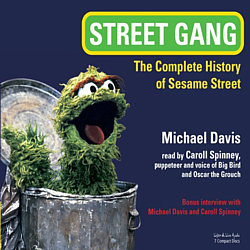
Street Gang: The Complete History of Sesame Street 
Author: Michael Davis; Reader: Caroll Spinney
(Audiobook - 2009; Original Book - 2008)
The biggest draw for the audiobook version of Street Gang is that they got Caroll Spinney, the voice and puppeteer of Big Bird and Oscar the Grouch, to read it. Because he did not actually write the book, there aren't as many opportunities to go into character as there was for Nancy Cartwright in her own book, but it's a significant bonus when he does get the chance, such as when Big Bird's lines from the episode that dealt with Mr. Hooper's death are quoted. The audiobook also contains a bonus interview with Spinney at the end, which contains some of my favorite parts. (Glad I'm not the only person in the world who seems to have malfunctioning facial recognition.)
While the book is a very comprehensive history of how Sesame Street was created, my concern is that it might not be as interesting as one would hope, reminding me at times of the business deals and legal procedures that were described in detail in Stealing MySpace. There are also so many people involved in the creation of the show, that I found it hard to keep every single person that it talks about clear in my mind. But when it comes to the big names, like co-creator Joan Ganz Cooney and, of course, Jim Henson, there is a lot of good information, although it can get really depressing at times. I kind of wish I didn't learn the whole story behind what happened to the actor who played David. I guess even a show like Sesame Street is not free of its scandals.
The beginning of the book talks at length about other children's programs that were popular before Sesame Street, especially Captain Kangaroo, which is interesting in some ways, but might make one wonder when it's actually going to get to Sesame Street. Well, eventually it does and stays pretty much on track, all the way up to Elmo's rise to stardom and the introduction of new character Zoe, meant to compete with Barney & Friends, but I kind of wish some of that stuff could've been shortened in favor of explaining the WTF-ery behind some of the early sketches and cartoons, particularly the nightmare fuel like this, and this, and this, and especially this, which it doesn't talk much about at all. Yeah, the book claims the purpose of Sesame Street was to help underprivileged children learn basic reading and counting skills so they wouldn't be so far behind when they reach kindergarten, but sometimes I wonder if they just liked scaring the crap out of them, too.
Rating: 3.5/5

The Suitors
Author: Cecile David-Weill; Reader: Kate Reading
(Audiobook & Original Book - 2012)
This book made the Oprah Book Club List and promised to be a comedy that satirizes rich people. It was originally written in French, so I have no idea if the problem is that something got severely lost in the translation, or if rich people's ideas of what is funny is too far removed from what mine is. I don't even think I could tell this was supposed to be satire, since it takes the perspective of the main character, a spoiled rich lady who wants to find a suitor so she can save their family's lavish summer home from being sold by her parents who no longer want to pay for its upkeep and servants. I don't even know what was supposed to be funny, unless every time she complains that a man is unfit to be her suitor because he uses the wrong word in a sentence or nitpicks some other "inappropriate" behavior, I'm supposed to throw my head back and slap my knee.
What I think this book is really intended for is for women to read it and fantasize about living this lifestyle. How else to explain the endless descriptions of the dinner and lunch menus, and the seating arrangements of the guests. I'm not blaming the audiobook's reader, but still... every time she had to read off a long list of the characters' names and the menu items, especially when half or more were in French, I wanted to punch somebody.
No plot, not a single relatable character, contempt for people who are not part of the wealthy 1%, and a subplot about the narrator's mother being addicted to drugs that seems to have been thrown in there to garner sympathy where there couldn't possibly be any, just about sums it up. Oh, but it's all satire! It makes fun of those people! Does it? I can't tell. If the original French version was different, forgive me, but I'm reviewing the English translation, and it sucks.
I've seen people who read (or tried to read) the book from Oprah's recommendation wondering what she was thinking in putting it on her list. I don't know how far all of you guys and girls got, but there's a part where the characters actually start talking about Oprah. Well, there you go.
Rating: 1/5
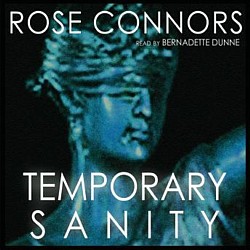
Temporary Sanity 
Author: Rose Connors; Reader: Bernadette Dunne
(Audiobook & Original Book - 2003)
I checked this book out on a whim, and holy crap, am I glad I did! It's a courtroom drama/murder mystery that had me completely riveted. Marty Nickerson is a Cape Cod D.A. who has recently become a defense lawyer, but her first two cases seem hopelessly unwinnable. For the first, her client was caught on live television shooting and killing the accused murderer of his seven-year-old son. There's no doubt that he actually did it, and he doesn't deny it, but Marty wants to get him off with the "temporary insanity" clause. For the other case, the boyfriend of a battered woman is found dead, and while the woman denies guilt and Marty believes her, no one else does. As it turns out, there may even be a connection between the two cases.
I'm not kidding when I say this story was suspenseful. I actually wanted to go to work every day so I could find out what happened next. Some parts of the trial, particularly when Marty's client took the stand and when the jury read their verdict, I held my breath. I can imagine criticizing how some of the events and plot twists near the end might deviate from reality too much, but I was still taken aback and surprised by them, and felt really content when the story concluded.
Rating: 4/5







